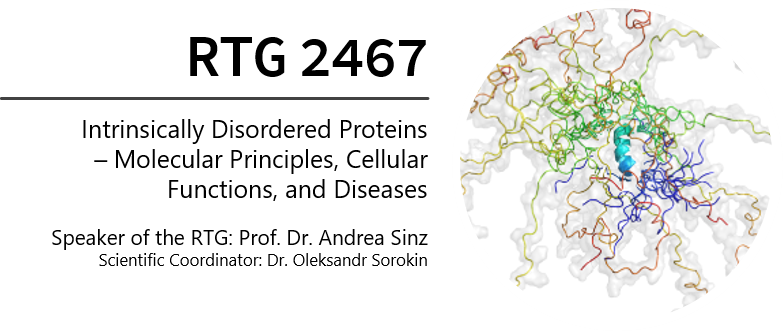The scientific qualification concept of the RTG will rely on five pillars:
- Induction week
- Student seminars (progress report series)
- Theoretical and hands-on workshops
- Annual RTG retreats, international summer school & students’ retreats
- Lecture series and personal exchange with IDP experts
Induction Week
Four to six weeks prior to their arrival, PhD students will receive an RTG Welcome Pack with relevant details on the city and University. They will also obtain an up-to-date IDP reading list with relevant books and selected papers to prepare them for their scientific projects. As we are planning that the students will start in cohorts, there will be a special induction week to familiarize them with the RTG infrastructure, the research campus and key topics in IDP research. During the induction week, PIs will introduce their scientific topic to the students. The structure of the RTG qualification program will be explained and some of our international IDP experts will provide introductory lectures for the newcomers and meet informally with the students for preliminary discussions. Students will also be introduced to the technology platforms (e.g. crystallography, NMR) and core facilities (e.g., imaging, mass spectrometry) of the Weinberg Campus through presentations by the relevant local experts. A half-day seminar ‘Introduction into experimental strategy, design and conduct’ will ensure that students are immediately made fully aware of relevant state-of-the-art research conduct rules. During this week there will be several social activities to facilitate networking.
Student Seminars
A vital part of the qualification program is an oral progress report series, which will take place twice a month, with two students presenting short progress reports, each followed by student-chaired discussions of the results. As for all other activities, communication will be in English. Attendance of this progress report series will be mandatory for PhD students, associates of the RTG, and participating PIs. It will be a forum to discuss relevant developments and, where applicable, problems incurred during individual projects. The progress report series will also provide a framework to broaden the participants’ horizons and help to place scientific findings into a general context. In the first three months, when experimental results are still slow in emerging, students will present and discuss seminal IDP papers to train their scientific reading and presentation skills.
Theoretical and Hands-On Workshops
Two or three one-day workshops will provide theoretical and practical expertise in various methods for studying IDPs, IDRs, and their complexes. Training courses and hands-on workshops will be taught by the PIs of the RTG, the RTG-associated investigators, and IDP experts of the international advisory board. At the start of the RTG and at the beginning of each funding year, a meeting of the Steering Committee will be held to discussthe topics of the workshops among all participating PIs, RTG students, and TAC members and thus to adapt the courses to the specific needs of the students. One workshop per year is mandatory for each student. An initial list of workshop topics is provided in the Table below.
| Jochen Balbach | Structural biology (NMR) | NMR spectroscopy to study intrinsically disordered proteins |
| Christian R. Eckmann | Cell biology of model organisms | Cloning, genome engineering and RNAi techniques Quantitative biology |
| Stephan M. Feller | Biochemistry of cell biology | 2D and 3D cancer cell culture methods Protein-protein interaction analyses using cell lysates Isothermal titration calorimetry |
| Hauke Lilie | Protein biochemistry | Protein purification UV-, fluorescence- and CD-spectroscopy for assessing protein conformations |
| Dariush Hinderberger | Biophysics of polymers | Electron paramagnetic spin spectroscopy Infrared reflection absorption spectroscopy |
| Stefan Hüttelmaier Nadine Bley | RNA biology, cell imaging | High resolution live cell imaging to study protein dynamics in cells via the CFI Transcriptome analyses by next generation sequencing (computation) |
| Panagiotis Kastritis | Computational structural biology | Predicting and understanding protein disorder and flexible protein-protein interactions by computational biology approaches |
| Marcel Köhn | RNA biology | Basics in cell culture Detection of cellular protein-RNA interactions via immunoprecipitation |
| Jens Meiler Steffen Lindert | Computational structural biology | Computational structural biology with the Rosetta modeling suite |
| Maria Ott | Biophysics of protein conformations | Single-molecule fluorescence spectroscopy Small angle X-ray scattering (SAXS) |
| Andrea Sinz | Cross-linking MS, proteomics | MS-based proteomics Cross-linking MS for studying protein conformations and protein-protein interactions |
| Milton T. Stubbs | Structural biology (X-ray) | Protein crystallization X-ray crystal structure determination |
Retreats
Retreats will be held once a year. Their specific program and contents will be adapted to the specific requirements jointly identified by PIs, students, and TAC members. The students will be prominently involved in the selection of topics and lecturers. The first event will be an RTG retreat where RTG members (students and PIs) will get to know each other better. Here, students will present their project plans and possibly initial results. An RTG retreat will also be held in the second year. In the third year, we will organize an international summer school where external IDP experts will be invited to give lectures. PhD students will present posters or talks to train their communicating skills and learn how to present their data to an international audience of experts.
The RTG students and associated students will organize an annual two-day “student-presentations-only” retreat, which will provide further opportunities for scientific discussions and intensify networking. Students will independently organize the venue, invite the guest speakers, and plan the accompanying social program. TAC members will be strongly encouraged to attend these retreats.
Lecture Series and Personal Exchange with IDP Experts
National and international IDP experts will be invited as seminar speakers to present their research. All speakers will be asked to focus their presentations on the general research areas of the RTG. They will generally be asked to stay on after their presentations to facilitate informal discussions with the RTG students and scientists.
